Israel Sets Ramadan Deadline For Assault On Gazan City Rafah
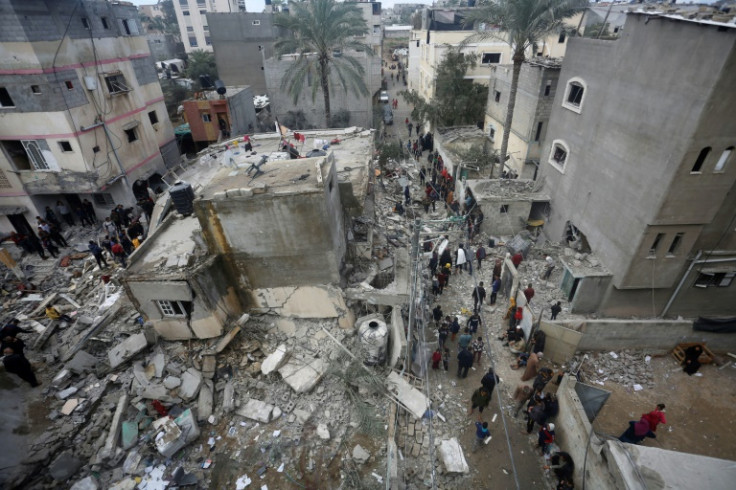
Israel has threatened to invade Gaza's Rafah by the start of Ramadan if Hamas does not return the remaining hostages by then, despite international pressure to protect Palestinian civilians sheltering in the southern city.
With prospects for truce talks dimmed, the United States and other governments, as well as the United Nations, have issued increasingly urgent appeals to Israel to call off its planned offensive on Rafah.
The Israeli government says the city on the Egypt border is the last remaining stronghold in Gaza of the Palestinian militant group Hamas.
But it is also where three-quarters of the displaced Palestinian population has fled, taking shelter in sprawling tent encampments without access to adequate food, water or medicine.
"The world must know, and Hamas leaders must know --- if by Ramadan our hostages are not home, the fighting will continue everywhere, including the Rafah area," Benny Gantz, a retired military chief of staff, told a conference of American Jewish leaders in Jerusalem on Sunday.
"Hamas has a choice. They can surrender, release the hostages and the civilians of Gaza can celebrate the feast of Ramadan," added Gantz, a member of the three-person war cabinet.
Ramadan, the Muslim holy month, is expected to begin around March 10.
Gantz said the offensive will be carried out in coordination with American and Egyptian partners to "minimise the civilian casualties as much as possible".
But where Palestinians can go after four months of war have flattened vast swathes of the Strip remains unclear.
"There's no safe place. Even the hospital is not safe," Ahmad Mohammed Aburizq told AFP from the morgue of a Rafah hospital where mourners gathered around a loved one wrapped in a white body bag.
"That's my cousin -- he was martyred in Al-Mawasi, in the 'safe area'. And my mother was martyred the day before."
For weeks, international mediators have sought to broker a truce-for-hostages deal that would pause fighting for six weeks.
Israeli Prime Minister Benjamin Netanyahu has played down the possibility of an impending breakthrough, calling Hamas's demands "delusional".
Even if a deal is struck, he insists the campaign to eliminate Hamas from Gaza will not be completed until clearing Rafah.
"Deal or no deal, we have to finish the job to get total victory," he said at the Jerusalem conference on Sunday.
With international pressure piling on Israel, the UN's top court will open a week of hearings from Monday examining the legal consequences of the country's 57-year occupation of Palestinian territories.
The hearings, requested by the UN General Assembly, are separate from South Africa's high-profile case alleging Israel is committing genocide in its current Gaza offensive.
At the UN's Security Council, the United States signalled it would veto the latest UN draft resolution seeking an immediate ceasefire should it come to a vote this week.
Ambassador Linda Thomas-Greenfield said the resolution would jeopardise the ongoing truce talks, as well as the broader aim of "an enduring resolution of hostilities".
Western governments have increasingly pushed for unilateral recognition of a Palestinian state to be part of that wider peace process, but Israel's government on Sunday unanimously adopted a declaration rejecting such recognition.
"After the terrible massacre of October 7, there can be no greater reward for terrorism than that and it will prevent any future peace settlement," Netanyahu said.
Hamas has meanwhile threatened to suspend its involvement in any ceasefire negotiations unless relief supplies reach Gaza's north, where aid agencies have warned of looming famine.
On Sunday morning, dozens of Israelis blocked Gaza-bound aid trucks from entering through the Nitzana crossing with Egypt, AFP reporters and the Palestinian Red Crescent Society said.
Gazans say they are going so hungry they are grinding animal feed into flour.
"My children are starving, they wake up crying from hunger. Where do I get food for them?" a northern Gazan woman told AFP.
The UN agency for Palestinian refugees said nearly three in four people are drinking contaminated water.
"The speed of deterioration in Gaza is unprecedented," it said.
After a week-long siege, the largest hospital still functional in Gaza is no longer operational, according to the World Health Organization.
At least 20 of the 200 patients still at the Nasser Hospital urgently require relocation to other facilities, WHO chief Tedros Adhanom Ghebreyesus said, adding that his organisation "was not permitted to enter" the site.
Seven patients, including a child, have died there since Friday due to power cuts, and "70 medical staff including intensive care doctors" have been arrested, according to the Hamas-run health ministry.
Israeli military spokesman Richard Hecht said diesel and oxygen supplies had been delivered on Saturday and a temporary generator was running.
Israeli troops in Khan Yunis were still operating around the hospital on Sunday after the military said it had "located additional weapons".
Israel has concentrated its military operations in Khan Yunis, just a few kilometres from Rafah and the hometown of Hamas's Gaza leader Yahya Sinwar, who is accused of orchestrating the October 7 attack.
The Hamas assault that launched the war killed about 1,160 people in Israel, mostly civilians, according to an AFP tally of Israeli figures.
Israel's retaliatory campaign in Gaza has killed at least 28,985 people, mostly women and children, according to the territory's health ministry.
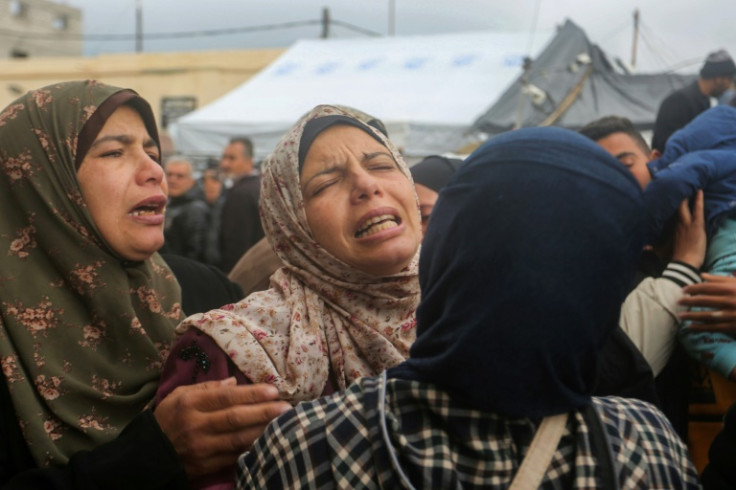
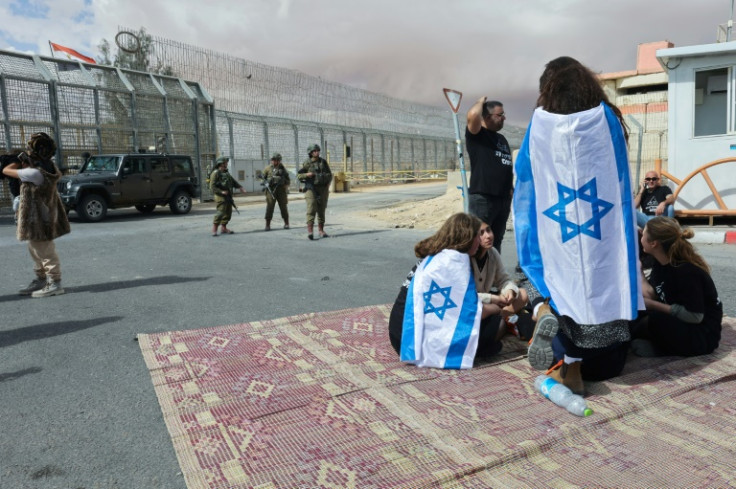
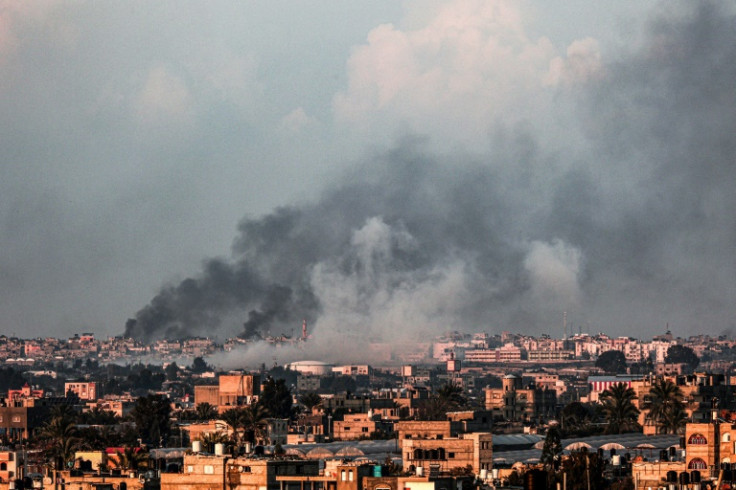
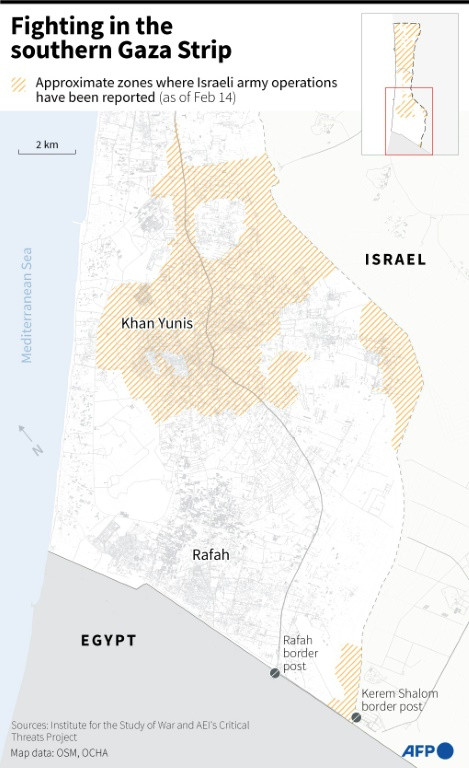
© Copyright AFP {{Year}}. All rights reserved.





















